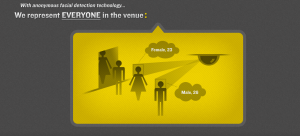Already, the service is generating controversy, with some locals calling the app “creepy.” Twitter and Facebook are full of negative reactions, and a glance at the company’s Twitter feed finds an endless stream of corrective statements (“We love our personal privacy too!”) and links to positive coverage.
“We've already met with the FTC to advocate for consumer privacy. And our data is aggregate, not individual,” read one SceneTap tweet.
Two bars listed as participants on the SceneTap web site — the pubs are actually under the same roof and operated jointly, Pete’s Tavern and Pedro’s Cantina — asked to have their names removed after a call from a reporter today. It turns out they were never approached by the company and have not installed the cameras. But after the list of participating bars was publicized, Jamie Roach, the bars’ event planner, said that they had received negative Yelp reviews and an irate email, even though the service has not yet launched.
“I don't know how they got us on the list,” said Roach, “They made a mistake.”
SceneTap did not respond to an emailed request for comment, but in an interview with SF Weekly, company founder Cole Harper defended its operation and tried to allay privacy concerns. “You actually give up more information when you hand a bouncer your ID at the door,” he told the site.
The company uses what it describes as proprietary "anonymous facial detection" software to count a bar’s occupants and determine their ages from a camera inside a club that is outfitted with a scanner. While bars often own or have access to security cameras, they won't have access to the SceneTap video feed. And unlike security companies, SceneTap said it does not store its cameras' contents. Users, however, can get real-time info about the number, age, and gender of the people at a participating bar, and bars get an opportunity to track, say, the effectiveness of drink promotion specials.
According to Janine Gallagher, general manager of Polo Grounds, SceneTap offers an opportunity for promotion as well. The bar recently renamed itself, she said, and the app is “a great way for businesses to get their name out there.”
“We're doing our launch this Friday, so we’re going to get to see, in actual execution, how it reflects our bar,” she said. The bar’s owner, Kevin Kynoch, said he was considering the use of the SceneTap technology as a “probationary period.”
“None of the data being used is specific,” he said, “it's just very generic info in terms of age and gender.”
But Pam Dixon, head of the World Privacy Forum, said that data generated by facial detection software generates a “face print” that could be easily used to identify specific individuals.
“In order to detect a person's age, gender, and demographic, you have to take a face print,” Dixon said, “And a face print is a unique ID, like a fingerprint.”
Dixon also echoed a concern raised by other SceneTap critics — that bar patrons may not be aware they are on camera and used as part of the app.
“Once you take a face print, you've crossed a certain line,” she said, “That’s the problem I have with it. SceneTap should not be taking the unique face print without an opt-in. I don’t know what bars are telling people.”
On Twitter, SceneTap reassured users that “notices are posted at the entrance.” Kynoch said that his bar would make promotional material plainly visible. As a former data manager, he said that he understood the general concern for privacy, but found SceneTap to be less intrusive than the kind of data harvesting that comes with the swipe of a credit card.
SceneTap is certainly not the only start-up using facial recognition technology: just last week, Klik, a mobile app that can recognize people’s faces before you can even snap a picture, completed its beta testing.
A few years ago, while working for another bar, Kynoch signed up for and then stopped using BarSpace, a site that provided a live stream of bar activity to users. If his patrons protest SceneTap, he said that he would get rid of it. For now, though, he’s willing to give it a try.
“In my opinion, as long as you're not sharing my personal financial details, or who my innate character is, I'm cool,” he said. As far as the kind of information SceneTap trades in, Kynoch said, “I feel like that knowledge is out there more than we know.”
This story was produced by The Bay Citizen, a project of the Center for Investigative Reporting. Learn more at www.thebaycitizen.org.
